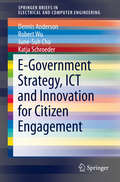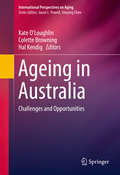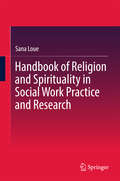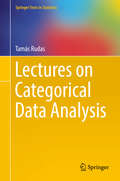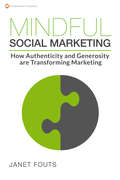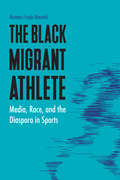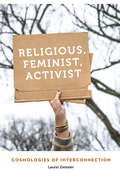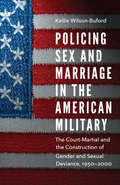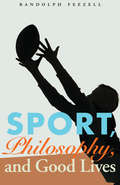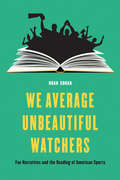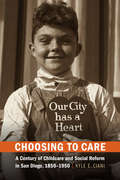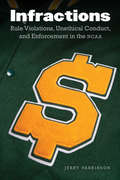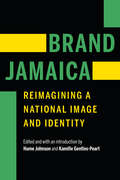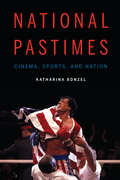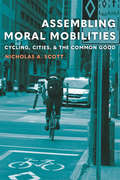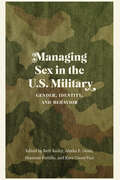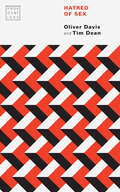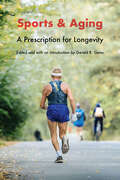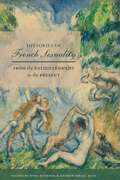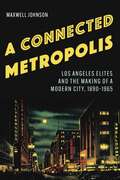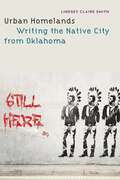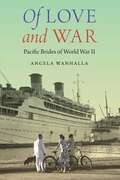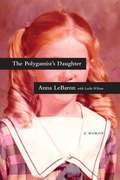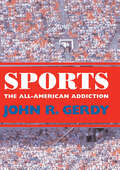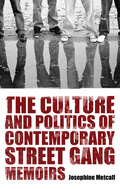- Table View
- List View
E-Government Strategy, ICT and Innovation for Citizen Engagement
by Dennis Anderson Robert Wu June-Suh Cho Katja SchroederThis book discusses three levels of e-government and national strategies to reach a citizen-centric participatory e-government, and examines how disruptive technologies help shape the future of e-government. The authors examine how e-government can facilitate a symbiotic relationship between the government and its citizens. ICTs aid this relationship and promote transparencies so that citizens can place greater trust in the activities of their government. If a government can manage resources more effectively by better understanding the needs of its citizens, it can create a sustainable environment for citizens. Having a national strategy on ICT in government and e-government can significantly reduce government waste, corruption, and inefficiency. Businesses, CIOs and CTOs in the public sector interested in meeting sustainability requirements will find this book useful.
Ageing in Australia: Challenges and Opportunities (International Perspectives on Aging #16)
by Kate O’loughlin Colette Browning Hal KendigThis stimulating volume examines the many faces of Australia's ageing population, the social and health issues they contend with, and the steps being taken--and many that should be taken--to help ensure a more positive and productive later life. Individual and societal ageing are conceptualized as developmental in nature, socially diverse, and marked by daily life challenges stemming from the country's economic structures, attitudes, geography, political landscape, and infrastructure. Wide-ranging coverage (e. g. , health, inequalities, employment, transportation) assesses options available to older people, and the role of families, employers, service providers, government agencies, and others in promoting or expanding those choices. The book's double emphasis on challenges in older people's lives and opportunities for enhancing their quality of life is on clear display as case studies examine policy issues--and propose solutions--in a societal and individual context. Included in the coverage: #65533; Australian developments in ageing: issues and history. #65533; Cultural diversity, health, and ageing. #65533; Indigenous Australians and ageing: responding to diversity in policy and practice. #65533; Enhancing the health and employment participation of older workers. #65533; Housing and the environments of ageing. #65533; Health services and care for older people. The rich examples in Ageing in Australia contain a depth of understanding and evidence for sociologists, gerontologists and psychologists studying ageing, health care professionals providing care to older people, and policy analysts assessing areas for improvement.
Handbook of Religion and Spirituality in Social Work Practice and Research
by Sana LoueThis singular reference explores religion and spirituality as a vital, though often misconstrued, lens for building better understanding of and empathy with clients. A diverse palette of faiths and traditions is compared and contrasted (occasionally with secularism), focusing on areas of belief that may inspire, comfort, or trouble clients, including health and illness, mental illness, healing, coping, forgiveness, family, inclusion, and death. From assessment and intervention planning to conducting research, these chapters guide professionals in supporting and assisting clients without minimizing or overstating their beliefs. In addition, the book's progression of ideas takes readers beyond the well-known concept of cultural competence to model a larger and more meaningful cultural safety. Among the topics included in the Handbook: Integrating religion and spirituality into social work practice. Cultural humility, cultural safety, and beyond: new understandings and implications for social work. Healing traditions, religion/spirituality, and health. Diagnosis: religious/spiritual experience or mental illness? Understandings of dying, death, and mourning. (Re)building bridges in and with family and community. Ethical issues in conducting research on religion and spirituality. The Handbook of Religion and Spirituality in Social Work Practice and Research is a richly-textured resource for social workers and mental health professionals engaged in clinical practice and/or research seeking to gain varied perspectives on how the religion and spirituality of their clients/research participants may inform their work.
Lectures on Categorical Data Analysis
by Tamás RudasThis book offers a relatively self-contained presentation of the fundamental results in categorical data analysis, which plays a central role among the statistical techniques applied in the social, political and behavioral sciences, as well as in marketing and medical and biological research. The methods applied are mainly aimed at understanding the structure of associations among variables and the effects of other variables on these interactions. A great advantage of studying categorical data analysis is that many concepts in statistics become transparent when discussed in a categorical data context, and, in many places, the book takes this opportunity to comment on general principles and methods in statistics, addressing not only the “how” but also the “why.” Assuming minimal background in calculus, linear algebra, probability theory and statistics, the book is designed to be used in upper-undergraduate and graduate-level courses in the field and in more general statistical methodology courses, as well as a self-study resource for researchers and professionals. The book covers such key issues as: higher order interactions among categorical variables; the use of the delta-method to correctly determine asymptotic standard errors for complex quantities reported in surveys; the fundamentals of the main theories of causal analysis based on observational data; the usefulness of the odds ratio as a measure of association; and a detailed discussion of log-linear models, including graphical models. The book contains over 200 problems, many of which may also be used as starting points for undergraduate research projects. The material can be used by students toward a variety of goals, depending on the degree of theory or application desired.
Mindful Social Marketing: How Authenticity and Generosity are Transforming Marketing
by Janet FoutsWith the firehose of information on the internet, how does a marketer stay sane? How can we be effective, enjoy our jobs and have real communication with the people that we want to connect to? If you're a marketer who feels overwhelmed by all the new roles getting thrown at you, mindfulness will increase your efficiency and help you be happier at your job. If you're already using mindfulness practices in your life, this book will give you new insight on how to use mindfulness in marketing and tested social media marketing tips that will help pull it all together. You'll also learn a few things about social media marketing along the way. Bottom line? Mindful Social Marketing will teach you how to use mindful business practices to be more focused, present, effective and happy at your job.
The Black Migrant Athlete: Media, Race, and the Diaspora in Sports (Sports, Media, and Society)
by Munene Franjo MwanikiThe popularity and globalization of sport have led to an ever-increasing migration of black athletes from the global South to the United States and Western Europe. While the hegemonic ideology surrounding sport is that it brings diverse people together and ameliorates social divisions, sociologists of sport have shown this to be a gross simplification. Instead, sport and its narratives often reinforce and re-create stereotypes and social boundaries, especially regarding race and the prowess and the position of the black athlete. Because sport is a contested terrain for maintaining and challenging racial norms and boundaries, the black athlete has always impacted popular (white) perceptions of blackness in a global manner.The Black Migrant Athlete analyzes the construction of race in Western societies through a study of the black African migrant athlete. Munene Franjo Mwaniki presents ten black African migrant athletes as a conceptual starting point to interrogate the nuances of white supremacy and of the migrant and immigrant experience with a global perspective. By using celebrity athletes such as Hakeem Olajuwon, Dikembe Mutombo, and Catherine Ndereba as entry points into a global discourse, Mwaniki explores how these athletes are wrapped in social and cultural meanings by predominately white-owned and -dominated media organizations. Drawing from discourse analysis and cultural studies, Mwaniki examines the various power relations via media texts regarding race, gender, sexuality, class, and nationality.
Religious, Feminist, Activist: Cosmologies of Interconnection (Anthropology of Contemporary North America)
by Laurel ZwisslerIn Religious, Feminist, Activist, Laurel Zwissler investigates the political and religious identities of women who understand their social-justice activism as religiously motivated. Placing these women in historical context as faith-based activists for social change, this book discusses what their activities reveal about the public significance of religion in the pluralistic context of North America and in our increasingly globalized world. Zwissler’s ethnographic interviews with feminist Catholics, Pagans, and United Church Protestants reveal radically different views of religious and political expression and illuminate how individual women and their communities negotiate issues of personal identity, spirituality, and political responsibility. Political activists of faith recount adventurous tales of run-ins with police, agonizing moments of fear and powerlessness in the face of global inequality, touching moments of community support, and successful projects that improve the lives of others. Religious, Feminist, Activist combines religion, politics, and globalization—subjects frequently discussed in macro terms—with individual personalities and intimate stories to provide a fresh perspective on what it means to be religiously and politically engaged. Zwissler also provides an insightful investigation into how religion and politics intersect for women on the political left.
Policing Sex and Marriage in the American Military: The Court-Martial and the Construction of Gender and Sexual Deviance, 1950–2000 (Studies in War, Society, and the Military)
by Kellie Wilson-BufordThe American military’s public international strategy of Communist containment, systematic weapons build-ups, and military occupations across the globe depended heavily on its internal and often less visible strategy of controlling the lives and intimate relationships of its members. From 1950 to 2000, the military justice system, under the newly instituted Uniform Code of Military Justice, waged a legal assault against all forms of sexual deviance that supposedly threatened the moral fiber of the military community and the nation. Prosecution rates for crimes of sexual deviance more than quintupled in the last quarter of the twentieth century. Drawing on hundreds of court-martial transcripts published by the Judge Advocate General of the Armed Forces, Policing Sex and Marriage in the American Military explores the untold story of how the American military justice system policed the marital and sexual relationships of the service community in an effort to normalize heterosexual, monogamous marriage as the linchpin of the military’s social order. Almost wholly overlooked by military, social, and legal historians, these court transcripts and the stories they tell illustrate how the courts’ construction and criminalization of sexual deviance during the second half of the twentieth century was part of the military’s ongoing articulation of gender ideology. Policing Sex and Marriage in the American Military provides an unparalleled window into the historic criminalization of what were considered sexually deviant and violent acts committed by U.S. military personnel around the world from 1950 to 2000.
Sport, Philosophy, and Good Lives
by Randolph FeezellThere&’s more to sports than the ethos of competition, entertainment, and commercialism expressed in popular media and discourse. Sport, Philosophy, and Good Lives discusses sport in the context of several traditional philosophical questions, including: What is a good human life and how does sport factor into it? To whom do we look for ethical guidance? What makes human activities or projects meaningful? Randolph Feezell examines these questions along with other relevant topics in the philosophy of sport such as the contribution of play to a meaningful life, the various reasons for pessimistic views of sport, the various claims that celebrated athletes are role models, and the seldom-questioned view that coaches are in a position to offer advice to athletes on how to live or on leadership skills. He also discusses the way that non-Western attitudes found in Buddhism, Taoism, and the Bhagavad Gita might be used to address the vulnerabilities of sports participants.Feezell draws from current sports issues, popular literature, and contemporary sports figures to shed light on the attraction and value of sports and examine the accompanying ethical issues.
We Average Unbeautiful Watchers: Fan Narratives and the Reading of American Sports (Sports, Media, and Society)
by Noah CohanSports fandom—often more than religious, political, or regional affiliation—determines how millions of Americans define themselves. In We Average Unbeautiful Watchers, Noah Cohan examines contemporary sports culture to show how mass-mediated athletics are in fact richly textured narrative entertainments rather than merely competitive displays. While it may seem that sports narratives are “written” by athletes and journalists, Cohan demonstrates that fans are not passive consumers but rather function as readers and writers who appropriate those narratives and generate their own stories in building their sense of identity. Critically reading stories of sports fans’ self-definition across genres, from the novel and the memoir to the film and the blog post, We Average Unbeautiful Watchers recovers sports games as sites where fan-authors theorize interpretation, historicity, and narrative itself. Fan stories demonstrate how unscripted sporting entertainments function as identity-building narratives—which, in turn, enhances our understanding of the way we incorporate a broad range of texts into our own life stories. Building on the work of sports historians, theorists of fan behavior, and critics of American literature, Cohan shows that humanistic methods are urgently needed for developing nuanced critical conversations about athletics. Sports take shape as stories, and it is scholars in the humanities who can best identify how they do so—and why that matters for American culture more broadly.
Choosing to Care: A Century of Childcare and Social Reform in San Diego, 1850-1950
by Kyle E. CianiIn Choosing to Care, Kyle E. Ciani examines the long history of interactions between parents and social reformers from diverse backgrounds in the development of social welfare programs, particularly childcare, in San Diego, California. Ciani explores how a variety of people—from destitute parents and tired guardians to benevolent advocates and professional social workers—connected over childcare concerns in a city that experienced tremendous demographic changes caused by urbanization, immigration, and the growth of a local U.S. military infrastructure from 1850 to 1950.Choosing to Care examines four significant areas where San Diego’s programs were distinct from, and contributed to, the national childcare agenda: the importance of the transnational U.S.–Mexico border relationship in creating effective childcare programs; the development of vocational education to curtail juvenile delinquency; the promotion of nursery school education; and the advancement of an emergency daycare program during the Great Depression and World War II. Ciani shows how children from families in unstable situations, especially children from Native American, Asian, Mexican-descent, African American, and impoverished Anglo families, challenged a social reform system that defined care as both social control and behavioral regulation.Choosing to Care incorporates a broader definition of childcare to include efforts by governmental and organizational bodies and persons to maintain and nurture the physical, mental, and social health and development of minors when parents and guardians cannot do so. It offers a more complex understanding of how multiple avenues and resources established social welfare in San Diego and other West Coast cities.
Infractions: Rule Violations, Unethical Conduct, and Enforcement in the NCAA
by Jerry ParkinsonJerry Parkinson spent nearly ten years, from 2000 to 2010, as a member of the NCAA’s Division I Committee on Infractions, participating in over one hundred major infractions cases. He came away from that experience—and the experience of reading extensive commentary on infractions cases—with the conviction that most observers do not understand the NCAA’s rules-enforcement process, despite the amount of public attention many major cases receive. Parkinson uses his insider’s perspective, along with illustrative stories, to help readers understand how the NCAA’s rules-enforcement process really works. These stories include: a university board of trustees chair committing suicide over an infractions case; a pay-for-play scandal leading directly to the state’s governor; a head coach falsely portraying a deceased player as a drug dealer to cover up the coach’s own misconduct; a gambler laundering his money by making the largest booster payments in NCAA history; and a coach’s sexual abuse of children leading to some of the harshest sanctions ever imposed by the NCAA. Based on years of experience and infused with insight, Parkinson provides a broad view of the world of NCAA rule breakers and the NCAA rules-enforcement process.
Brand Jamaica: Reimagining a National Image and Identity
by Hume Johnson Kamille Gentles-PeartBrand Jamaica is an empirical look at the postindependence national image and branding project of Jamaica within the context of nation-branding practices at large. Although a tiny Caribbean island inhabited by only 2.8 million people, Jamaica commands a remarkably large presence on the world stage. Formerly a colony of Britain and shaped by centuries of slavery, violence, and plunder, today Jamaica owes its popular global standing to a massively successful troika of brands: music, sports, and destination tourism. At the same time, extensive media attention focused on its internal political civil war, mushrooming violent crime, inflation, unemployment, poverty, and abuse of human rights have led to perceptions of the country as unsafe.Brand Jamaica explores the current practices of branding Jamaica, particularly within the context of postcoloniality, reconciles the lived realities of Jamaicans with the contemporary image of Jamaica projected to the world, and deconstructs the current tourism model of sun, sand, and sea. Hume Johnson and Kamille Gentles-Peart bring together multidisciplinary perspectives that interrogate various aspects of Jamaican national identity and the dominant paradigm by which it has been shaped.
National Pastimes: Cinema, Sports, and Nation (Sports, Media, and Society)
by Katharina BonzelSports have long fascinated filmmakers from Hollywood and beyond, from Bend It Like Beckham to Chariots of Fire to Rocky. Though sports films are diverse in their approach, style, and storytelling modes, National Pastimes discloses the common emotional and visual cues that belie each sports film&’s underlying nationalistic impulses. Katharina Bonzel unravels the delicate matrix of national identity, sports, and emotion through the lens of popular sports films in comparative national contexts, demonstrating in the process how popular culture provides a powerful vehicle for the development and maintenance of identities of place across a range of national cinemas. As films reflect the ways in which myths of nation and national belonging change over time, they are implicated in important historical moments, from Cold War America to the class dynamics of 1980s Thatcherite Britain to the fragmented sense of nation in post-unification Germany. Bonzel shows how sports films provide a means for renegotiating the boundaries of national identity in an accessible, engaging form. National Pastimes opens up new ways of understanding how films appeal to the emotions, using myth-like constructions of the past to cultivate spectators&’ engagement with historical events.
Assembling Moral Mobilities: Cycling, Cities, and the Common Good
by Nicholas A. ScottIn the years since the new mobilities paradigm burst onto the social scientific scene, scholars from various disciplines have analyzed the social, cultural, and political underpinnings of transport, contesting its long-dominant understandings as defined by engineering and economics. Still, the vast majority of mobility studies, and even key works that mention the &“good life&” and its dependence on the car, fail to consider mobilities in connection with moral theories of the common good. In Assembling Moral Mobilities Nicholas A. Scott presents novel ways of understanding how cycling and driving animate urban space, place, and society and investigates how cycling can learn from the ways in which driving has become invested with moral value. By jointly analyzing how driving and cycling reassembled the &“good city&” between 1901 and 2017, with a focus on various cities in Canada, in Detroit, and in Oulu, Finland, Scott confronts the popular notion that cycling and driving are merely antagonistic systems and challenges social-scientific research that elides morality and the common good. Instead of pitting bikes against cars, Assembling Moral Mobilities looks at five moral values based on canonical political philosophies of the common good, and argues that both cycling and driving figure into larger, more important &“moral assemblages of mobility,&” finally concluding that the deeper meta-lesson that proponents of cycling ought to take from driving is to focus on ecological responsibility, equality, and home at the expense of neoliberal capitalism. Scott offers a fresh perspective of mobilities and the city through a multifaceted investigation of cycling informed by historical lessons of automobility.
Managing Sex in the U.S. Military: Gender, Identity, and Behavior (Studies in War, Society, and the Military)
by Beth Bailey Alesha E. Doan Shannon Portillo Kara Dixon VuicThe U.S. military is a massive institution, and its policies on sex, gender, and sexuality have shaped the experiences of tens of millions of Americans, sometimes in life-altering fashion. The essays in Managing Sex in the U.S. Military examine historical and contemporary military policies and offer different perspectives on the broad question: &“How does the U.S. military attempt to manage sex?&” This collection focuses on the U.S. military&’s historical and contemporary attempts to manage sex—a term that is, in practice, slippery and indefinite, encompassing gender and gender identity, sexuality and sexual orientation, and sexual behaviors and practices, along with their outcomes. In each chapter, the authors analyze the military&’s evolving definitions of sex, sexuality, and gender, and the significance of those definitions to both the military and American society.
Hatred of Sex (Provocations)
by Oliver Davis Tim DeanHatred of Sex links Jacques Rancière&’s political philosophy of the constitutive disorder of democracy with Jean Laplanche&’s identification of a fundamental perturbation at the heart of human sexuality. Sex is hated as well as desired, Oliver Davis and Tim Dean contend, because sexual intensity impedes coherent selfhood and undermines identity, rendering us all a little more deplorable than we might wish. Davis and Dean explore the consequences of this conflicted dynamic across a range of fields and institutions, including queer studies, attachment theory, the #MeToo movement, and &“traumatology,&” demonstrating how hatred of sex has been optimized and exploited by neoliberalism. Advancing strong claims about sex, pleasure, power, intersectionality, therapy, and governance, Davis and Dean shed new light on enduring questions of equality at a historical moment when democracy appears ever more precarious.
Sports and Aging: A Prescription for Longevity
by Gerald R. GemsIn Sports and Aging a wide-ranging group of physically active people, including many scholar-athletes, fifty years and older, discuss sports in the context of aging and their own athletic experiences. This collection of personal accounts includes a spectrum of contributors across genders, social classes, and racial, ethnic, national, religious, and educational backgrounds to determine whether there are any common characteristics that can promote long, happy, healthy, and meaningful lifespans. In this fresh look at the role of sports in the process of aging, contributors range from a ninety-six-year-old great-grandmother to a former Olympian. Many contributors have used education to better their lot in life or to find solace and meaning in the service of others. For all, sports or physical activity has enhanced their health and temperament and provided a sense of community.
Histories of French Sexuality: From the Enlightenment to the Present
by Nina Kushner Andrew Israel RossHistories of French Sexuality contends that the history of sexuality is at a crossroads. Decades of scholarship have shown that sexuality is implicated in a wide range of topics, such as studies of reproduction, the body, sexual knowledge, gender identity, marriage, and sexual citizenship. These studies have broadened historical narratives and interpretations of areas such as urbanization, the family, work, class, empire, the military and war, and the nation. Yet while the field has evolved, not everyone has caught on, especially scholars of French history. Covering the early eighteenth century through the present, the essays in Histories of French Sexuality show how attention to the history of sexuality deepens, changes, challenges, supports, or otherwise complicates the major narratives of French history. This volume makes a set of historical arguments about the nature of the past and a larger historiographical claim about the value and place of the field of the history of sexuality within the broader discipline of history. The topics include early empire-building, religion, the Enlightenment, feminism, socialism, formation of the modern self, medicine, urbanization, decolonization, the social world of postwar France, and the rise of modern and social media.
A Connected Metropolis: Los Angeles Elites and the Making of a Modern City, 1890–1965
by Maxwell JohnsonIn A Connected Metropolis Maxwell Johnson describes Los Angeles&’s rise in the early twentieth century as catalyzed by a series of upper-class debates about the city&’s connections to the outside world. By focusing on specific moments in the city&’s development when tensions over Los Angeles&’s connections, or lack thereof, emerged, Johnson ties each movement to two or three contemporary figures who influenced the debates at hand. The elites&’ previous efforts to secure nationwide and global connections for Los Angeles were wildly successful following World War II. As a result, the city became a landing spot for African American migrants, Cambodian and Laotian refugees, and Mexican and Central American immigrants. Johnson argues that the city&’s history is more defined by external relationships than previously understood, and those relationships have given the history of the city more continuity than originally recognized. At the turn of the twentieth century, the politics of connection revolved around initiatives to tie Los Angeles to other places both tangibly and metaphorically. Elites built tangible connections to secure, among other things, the water that irrigated the citrus farms of Los Angeles, the capital that propelled its businesses, and the people who migrated from the Midwest to buy its houses. To build metaphorical connections that located the city amid transcontinental and trans-Pacific movements, elites themselves often transcended nearby borders and pursued connections at will. Los Angeles stood as a focal point for elite ambitions, a place with a more ambivalent relationship to external connections. The true story of Los Angeles&’s rise lies in the spectacular visions and rambunctious activism of a group of elite men dedicated to transforming a remote frontier town into a global metropolis.
Urban Homelands: Writing the Native City from Oklahoma
by Lindsey Claire SmithOklahoma is bound to both the South and the Southwest and their legacies of conquest and Indigenous survivance. At the same time, mobility, ingenuity, cultural exchange, and creative expression—all part of the experience of urbanization—have been fundamental to people of the tribes that call this place home. Tulsa, New Orleans, and Santa Fe, with their importance in histories of geopolitical upheaval and mobility that shaped the establishment of the United States, are key to uncovering the history of urbanization experienced by Native Americans from Oklahoma.Urban Homelands, while examining the overlooked histories of Oklahoma Indigenous urbanization relative to these regions, engages literature and film as not just mirrors of experience but as producers of it. Lindsey Claire Smith brings the work of three-time poet laureate Joy Harjo into conversation with the great Cherokee playwright Lynn Riggs and breakout filmmaker Sterlin Harjo. Flying in the face of civic landmarks and settler histories that at once obscure Native origins and appropriate Native culture for tourism, this creative reclaiming of Indigenous cities points toward the productive possibilities of recognizing untold urban histories and the creative relationships with urban space itself.
Of Love and War: Pacific Brides of World War II (Studies in Pacific Worlds)
by Angela WanhallaBetween 1942 and 1945 more than two million servicemen occupied the southern Pacific theater, the majority of whom were Americans in service with the U.S. Army, Navy, Air Force, and Marines. During the occupation, American servicemen married approximately 1,800 women from New Zealand and the island Pacific, creating legal bonds through marriage and through children. Additionally, American servicemen fathered an estimated four thousand nonmarital children with Indigenous women in the South Pacific Command Area. In Of Love and War Angela Wanhalla details the intimate relationships forged during wartime between women and U.S. servicemen stationed in the South Pacific, traces the fate of wartime marriages, and addresses consequences for the women and children left behind. Paying particular attention to the experiences of women in New Zealand and in the island Pacific—including Tonga, Fiji, Samoa, and the Cook Islands—Of Love and War aims to illuminate the impact of global war on these women, their families, and Pacific societies. Wanhalla argues that Pacific war brides are an important though largely neglected cohort whose experiences of U.S. military occupation expand our understanding of global war. By examining the effects of American law on the marital opportunities of couples, their ability to reunite in the immediate postwar years, and the citizenship status of any children born of wartime relationships, Wanhalla makes a significant contribution to a flourishing scholarship concerned with the intersections between race, gender, sexuality, and militarization in the World War II era.
The Polygamist's Daughter: A Memoir
by Anna LeBaron Leslie WilsonMy father had thirteen wives and more than fifty children . . . This is the haunting memoir of Anna LeBaron, daughter of the notorious polygamist and murderer Ervil LeBaron. Ervil’s criminal activity kept Anna and her siblings constantly on the run from the FBI. Often starving, the children lived in a perpetual state of fear—and despite their numbers, Anna always felt alone. Would she ever find a place she truly belonged? Would she ever be anything other than the polygamist’s daughter? Filled with murder, fear, and betrayal, The Polygamist’s Daughter is the harrowing, heart-wrenching story of a fatherless girl and her unwavering search for love, faith, and a place to call home.
Sports: The All-American Addiction
by John R. GerdyJohn R. Gerdy knows sports inside-out. He has been an All-American basketball player whose college jersey was retired. He was briefly a professional player. Later he served as an associate commissioner in the NCAA's Southeastern Conference and as a legislative and ethical advisor to the NCAA and the Knight Commission. Currently he teaches courses on sports administration. Now, in Sports: The All-American Addiction, he brings his insights and observations together in a radical, critical evaluation of the impact of sports on American life. This book argues that our society's huge investment in organized sports is unjustified. Ardent boosters say that sports embody the “American Way,” developing winners by teaching lessons in sportsmanship, teamwork, and discipline. In fact, Gerdy writes, modern sports are eroding American life and undermining traditional American values essential to the well-being of the nation and its people. Like a drug, this obsession allows Americans to escape problems and ignore issues. Gerdy asks tough questions. Have sports lost their relevance? Is it just mindless entertainment? Is our enormous investment in sports as educational tools appropriate for a nation that needs graduates to compete in the information-based, global economy of the twenty-first century? Do organized sports continue to promote positive ideals? Or, do sports, in the age of television, corporate sky boxes, and sneaker deals, represent something far different? Boldly making his case, Gerdy detects five causes for alarm. A violent, win-at-all-cost mentality exists. A greater number of spectators are idly watching the few elite athletes. An athletic culture that is anti-intellectual systematically creates “dumb jocks.” While bridges, inner-cities, and schools are crumbling, tremendous sums of tax dollars vanish to wealthy owners, millionaire players, and to college athletic programs. Studies show that sports are no more effective in promoting equality than any other American institution. Can organized sports be restructured? The author concludes with a series of daring suggestions for change.
The Culture and Politics of Contemporary Street Gang Memoirs
by Josephine MetcalfThe publication of Sanyika Shakur's Monster: The Autobiography of an L.A. Gang Member in 1993 generated a huge amount of excitement in literary circles—New York Times book critic Michiko Kakutani deemed it a “shocking and galvanic book”—and set off a new publishing trend of gang memoirs in the 1990s. The memoirs showcased tales of violent confrontation and territorial belonging but also offered many of the first journalistic and autobiographical accounts of the much-mythologized gang subculture. In The Culture and Politics of Contemporary Street Gang Memoirs, Josephine Metcalf focuses on three of these memoirs—Shakur’s Monster; Luis J. Rodriguez’s Always Running: La Vida Loca: Gang Days in L.A.; and Stanley “Tookie” Williams’s Blue Rage, Black Redemption—as key representatives of the gang autobiography. Metcalf examines the conflict among violence, thrilling sensationalism, and the authorial desire to instruct and warn competing within these works. The narrative arcs of the memoirs themselves rest on the process of conversion from brutal, young gang bangers to nonviolent, enlightened citizens. Metcalf analyzes the emergence, production, marketing, and reception of gang memoirs. Through interviews with Rodriguez, Shakur, and Barbara Cottman Becnel (Williams’s editor), Metcalf reveals both the writing and publishing processes. This book analyzes key narrative conventions, specifically how diction, dialogue, and narrative arcs shape the works. The book also explores how these memoirs are consumed. This interdisciplinary study—fusing literary criticism, sociology, ethnography, reader-response study, and editorial theory—brings scholarly attention to a popular, much-discussed, but understudied modern expression.
